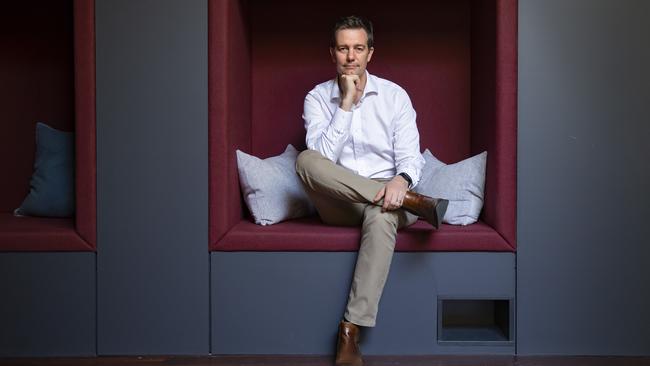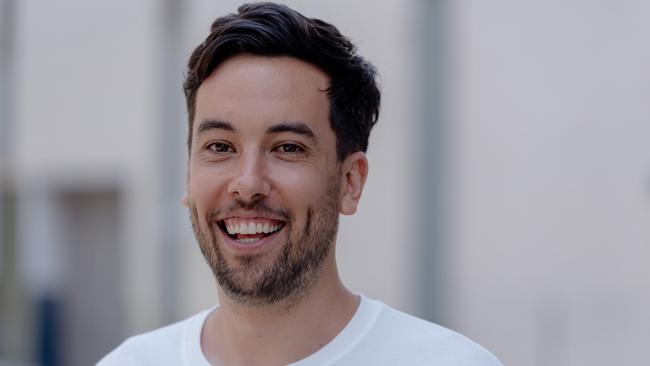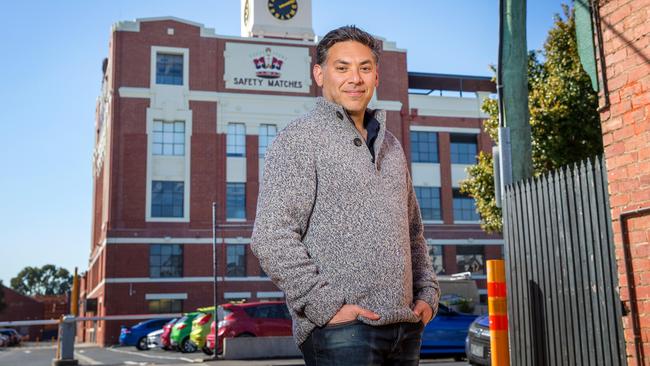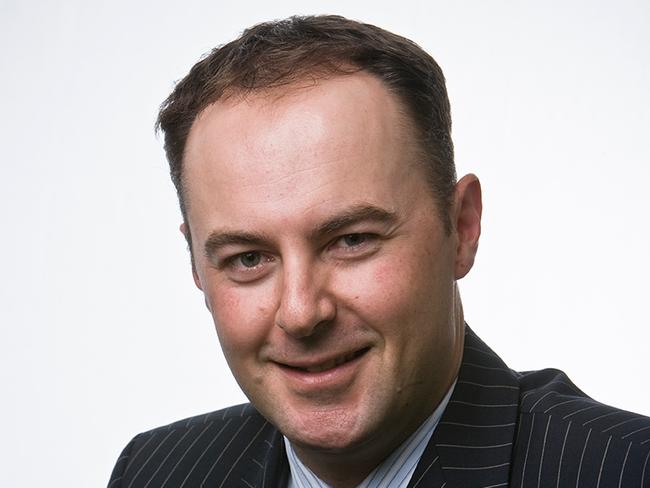A year after the tech sector was awash with money, ‘unicorns’ ponder plunging values
A year ago it was the ‘best time to be a founder in Australian history’. But now start-ups are facing tougher economic conditions and big questions about the big valuations they attracted.

It didn’t take Didier Elzinga long to start second guessing the $135m he had just raised.
Almost a year ago to the day, in late July 2021, Elzinga’s tech start-up Culture Amp announced the Series F funding that gave it coveted unicorn status with a $1bn valuation.
It was a heady time for the sector. It seemed a week would not go by without a big raising announcement. On paper, the wealth of founders skyrocketed.
Software firms and other start-ups fell over themselves to show how huge amounts of money were coming through the door to give them previously unheard of valuations, and investment funds were revelling in the returns they were making.
Market darling Canva, the graphics design start-up headed by young billionaires Melanie Perkins and Cliff Obrecht, encapsulated what was happening. A June 2020 raising put its value at $US6bn. By April 2021, another raising saw it hit $US15bn. In September, Canva hit a record $US40bn.
It wasn’t that Elzinga wasn’t proud of his achievements at Culture Amp, which provides employee feedback and analytics services around the world.

He just had a nagging thought he had raised the funds at a number that was suddenly too low compared to what else was happening in a hot market.
“I remember thinking at the time that I’ve done pretty well and raised a good valuation,” Elzinga, a member of The List – Top 100 Innovators, tells The Weekend Australian.
“Early in the process of starting Culture Amp, we used to value companies in terms of multiples of profit or EBITDA, and then in a very short period of time it went from (investors saying) ‘we’re going to pay eight to 10 times EBITDA’, to eight to 10 times revenue, then it became 20 times, then it became 40 times, then it became 80 times.
“So six months (after raising $135m), there were several other people in our industry raising at significantly higher multiples to what we had raised at and I thought I was quite poor at my job.”
Elzinga isn’t thinking that way any more. Tech firms the world over are having their valuations slashed – Canva has been said to be trading privately in the US at a valuation of about $20bn, less than half its last raising figure – and the industry is dealing with cost-cutting, staff lay-offs and a slowing economy, among many issues that didn’t seem apparent a year ago.
“Now I think I’m quite happy with our raise,” Elzinga said. “So it’s a difficult time to raise right now because everybody’s trying to see what’s going to happen next. Right now I wouldn’t be [raising funds] because I think everybody is a little jittery.”
The value of tech stocks on the Nasdaq exchange in the US have plummeted this year. Australia’s Atlassian, the software firm headed by Mike Cannon-Brookes and Scott Farquhar, has not been immune. Its shares are down about 40 per cent since January.
That has fed down to the private market, as Australian venture capital funds such as Square Peg, Blackbird Ventures and Airtree Ventures trim valuations in their portfolio.
The IPO market is virtually closed as well, postponing quick exits and liquidity events.
Airtree has told founders in its portfolio that anyone looking to raise capital that enough funds to last six to 12 months won’t cut it, and that companies should aim for two years’ funding instead.

Square Peg, which has invested in companies such as Canva, Airwallex, ROKT, Deputy and Prospa, recently told investors it was marking down three of its funds by a combined $175m.
“We feel good about the companies that we invested in during 2021 (both new investments and follow-on investments) and believe that we didn’t compromise on quality,” Square Peg said in an investor note. “Valuations were higher than they should have been and inevitably that will impact returns on those investments. We have been reflecting on this and remain committed to learning from our mistakes.”
A year ago, Nick Crocker, a partner at Blackbird Ventures, said it was “the best time to be a founder in Australian history”.
Now, Crocker says the sentiment around listed stocks has had an impact on privately held start-ups. The big upswing in valuations is not there any more, and new funding rounds are at best starting at previous valuations – and then only moving downwards from there. “Public market valuations have had a severe retreat and that is now cascading down through the private markets, with growth rounds being reset, series B and C rounds impacted and so on through the early stages,” he says.
“For seed and A, there is still a digestion in progress but we are noticing rounds from last year being reopened at the same valuation to new external investors, which is a relatively new phenomenon.”

Airwallex is one example. It is reportedly set to raise about up to $US150m ($217m) from investors, including Visa, at the same valuation, $5.5bn, it achieved after a $US100m raising last November.
Crocker says there has been a noted shift in what investors are looking for, with more of a focus on founders deploying their capital with discipline, rather than going on a spending spree to grow as quickly as possible.
“The change is in what investors are valuing. Growth isn’t as highly valued today as it was last year. Efficiency is the thing that I think investors are focusing on more now than they have in many years,” he says.
Elzinga feels that market conditions are getting back to more of a sense of normal and Paul Naphtali, co-founder of venture capital fund Rampersand, points out that the Nasdaq is now only back to its level of less than two years ago.
“Within our industry you’re reading the blogs and the newspapers and the commentary is that it’s a disaster and we’ve been bombed into oblivion. We’ll never get out of it and we’re at an all time terrible situation. But if you look at the Nasdaq, it’s gone all the way back to October 2020,” Naphtali says. “We wrote to all our portfolio companies in March 2020 (when Covid hit), saying … you’re probably not going to grow a lot over the next two years. You therefore need to have enough capital to survive and to thrive over the next two years so make decisions now, and we were wrong. We were right for about six weeks.”
Naphtali stresses that the world is in an unprecedented period of adoption of technology, and that Australian start-ups could be on the cusp of a “golden era” – they just have to survive the present-day situation.
There are bright spots. Technology in the health sector has been a laggard relative to other industries – Mark McConnell of The Citadel Group likes to joke “if you want your children to see a fax machine, go to a hospital” – and is now playing catch-up.
McConnell says demand for health tech companies is strong and that there has been about $2bn of merger and acquisition activity in his sector across the world in the past two months alone.
Citadel could be worth $1.5bn now for its investors, up from last year as it wins a series of big health tech deals across the National Health Service in the UK.

“We exist in the sweet convergence zone of health, tech and cyber – the market is coming to us, driven by regulatory pressure and functional enhancements,” McConnell says.
Prezzee, the digital gift card company majority-owned by billionaire Shaun Bonett, a member of The List – Australia’s Richest 250, also achieved unicorn status last year. Chief executive Jamie Samaha says Prezzee, which has trebled the number of employees around the world in the past year and achieved a 400 per cent increase in revenue, has the plans for funds to continue to expand into countries such as France and Germany this year.
But he says Prezzee will keep a “cautiously optimistic” mindset on its growth plans just in case the wider economy deteriorates.
“We’re going to watch the next six months and say, OK, although we’re planning to make those investments, we’re just giving it a little bit of flexibility that if the macro environment deteriorates even further … we have some flexibility to pause some of those investments.”
Crocker says he is still confident that the well-run Australian unicorns of 2021 will endure.
“A quality company – one with huge ambition, product and customer obsession, and a generational culture – was a quality company last year, and is still a quality company today,” he says.
Elzinga believes there will be optimism about start-ups as 2022 progresses. But investors have to take a longer-term view: “Most of the investors that we are working with look at it and go, ‘we’re never going to get it perfectly right. But if you grow for 10,15, 20, 25 years, that will actually make up for some of the assumptions we might get wrong’.”






To join the conversation, please log in. Don't have an account? Register
Join the conversation, you are commenting as Logout